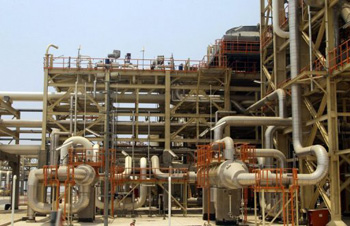 Reuters: Turkey’s decision to ignore a U.S. ban on gasoline sales to Iran has brought in cash and fostered Turkey’s image as an emerging regional power, but Ankara is unlikely to risk alienating Washington for long.
Reuters: Turkey’s decision to ignore a U.S. ban on gasoline sales to Iran has brought in cash and fostered Turkey’s image as an emerging regional power, but Ankara is unlikely to risk alienating Washington for long.
By Thomas Grove and David Sheppard
 ISTANBUL/LONDON, Aug 16 (Reuters) – Turkey’s decision to ignore a U.S. ban on gasoline sales to Iran has brought in cash and fostered Turkey’s image as an emerging regional power, but Ankara is unlikely to risk alienating Washington for long.
ISTANBUL/LONDON, Aug 16 (Reuters) – Turkey’s decision to ignore a U.S. ban on gasoline sales to Iran has brought in cash and fostered Turkey’s image as an emerging regional power, but Ankara is unlikely to risk alienating Washington for long.
The United States has largely looked the other way as its NATO ally has strengthened political and economic ties with Iran as part of Ankara’s long-term energy strategy.
But Washington’s tolerant attitude may end if Turkey continues to take the bite out of U.S. sanctions or boost its ties with the Islamic Republic beyond a symbolic partnership.
“(Turkey is) trying to place itself in the same league as superpowers such as China and Russia, who have adopted similar measures,” said Middle East analyst Meir Javedanfar at Meepas.
“In the long run, Turkey’s gambit may backfire, as such measures will be viewed unfavourably by both the United States and European Union. It is a very risky strategy,” he said.
Turkey has already made more than $200 million in gasoline sales to Iran since June, with much of it at a 25 percent premium over the market rate.
Turkish Energy Minister Taner Yildiz told Reuters Ankara would support private companies making sales to Iran. Turkey’s broader strategy sees itself at the centre of an increasingly prosperous and stable Middle East.
“Turkey is trying to figure out where it stands as a regional power,” said Jamie Webster, a senior consultant at PFC Energy.
“It’s certainly looking to build its trade ties in the Middle East. In many ways it’s looking to follow the Dubai model by becoming a regional trading hub,” he said.
LONG-TERM PLANS
Iran, which provides a third of Turkey’s natural gas supplies, has proved at times to be an unreliable energy partner in its past delivery and payments demands.
Yet a 1 billion euro ($1.3 billion) Turkish pipeline project that will bring 110 million cubic metres of gas over the border from Iran shows Turkey plans to put its doubts to one side to access the second-largest gas reserve in the world.
In an uncharacteristic turn of events, Turkey said last week it was going to pay Iran more than $600 million in back payments for gas deliveries it did not use as part of a take-or-pay clause in the two country’s bilateral gas treaty.
Turkey has gone to arbitration courts for similar claims in the past.
“It demonstrates that the Turks clearly want to retain that goodwill with the Iranians in order to be able to access more Iranian gas in the future,” said Noel Tomnay, a global gas analyst at Wood Mackenzie consultants in Edinburgh.
“It’s also all part of Turkey trying to demonstrate that it’s an honourable transit country to take whatever gas is going to come to Europe from multiple sources,” he said.
Any international firms that sell gasoline to Iran could face retribution under the U.S. sanctions including a possible ban from the U.S. financial system or denial of U.S. contracts.
DOMESTIC POLITICS
U.S. President Barack Obama is heading into mid-term elections, which will serve to measure the public’s approval of his tenure in office. There is a risk U.S. politicians on both sides of the aisle may push to make an example out of Turkey.
“The Turks may be in for a bad surprise if they think there is no limit,” said independent energy analyst Gareth Winrow.
“The Turks can ultimately overplay their hand.”
Analysts said the United States might target Turkish companies involved in gasoline sales if the next round of diplomacy fails. Some companies might already be backing out.
Tupras, Turkey’s sole refiner and gasoline exporter which is owned by Koc Holding, is sensitive to the risks but also to the benefits of the current trade.
A source at Tupras, speaking on the condition of anonymity, said the company’s relationship with Iran was more important than its ties to the United States as Tupras gets nearly a third of its crude oil from the Islamic Republic.
In a letter to the Financial Times on July 26, Tupras head Yavuz Erkut said the sales were arranged before U.S. sanctions.
“The government appears keen to extend its trade ties, but in this case the business community doesn’t seem so sure,” Webster at PFC said.
Any pressure on Turkey is unlikely to be received well in the short term, with both the government and opposition gearing up for a key referendum in September and an election next year. Nationalist and Islamic sentiment has been on the rise since the deadly Israeli raid on the Gaza aid flotilla in May.
“There is strong public support in Turkey to stand its own ground, and that includes supporting Iran rather than being seen to be influenced by threats from the United States,” said Samantha Wolreich, a senior risk consultant at AKE Limited.
“A large part of Turkey’s current stance towards Iran is posturing for the domestic audience.” (Writing by David Sheppard and Thomas Grove, additional reporting by Daniel Fineren, editing by Jane Baird)


